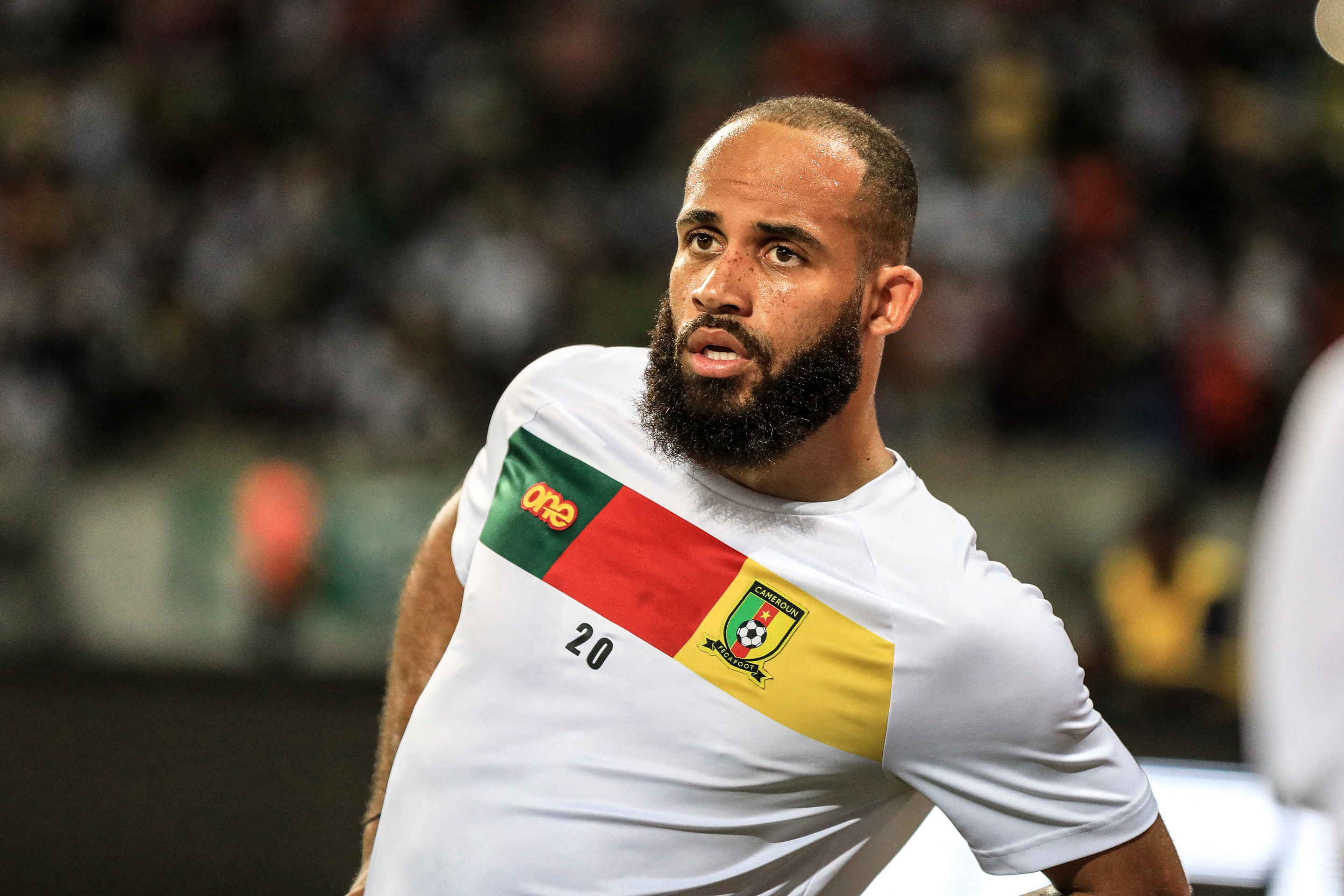10. Paul Scholes (1991-2013)
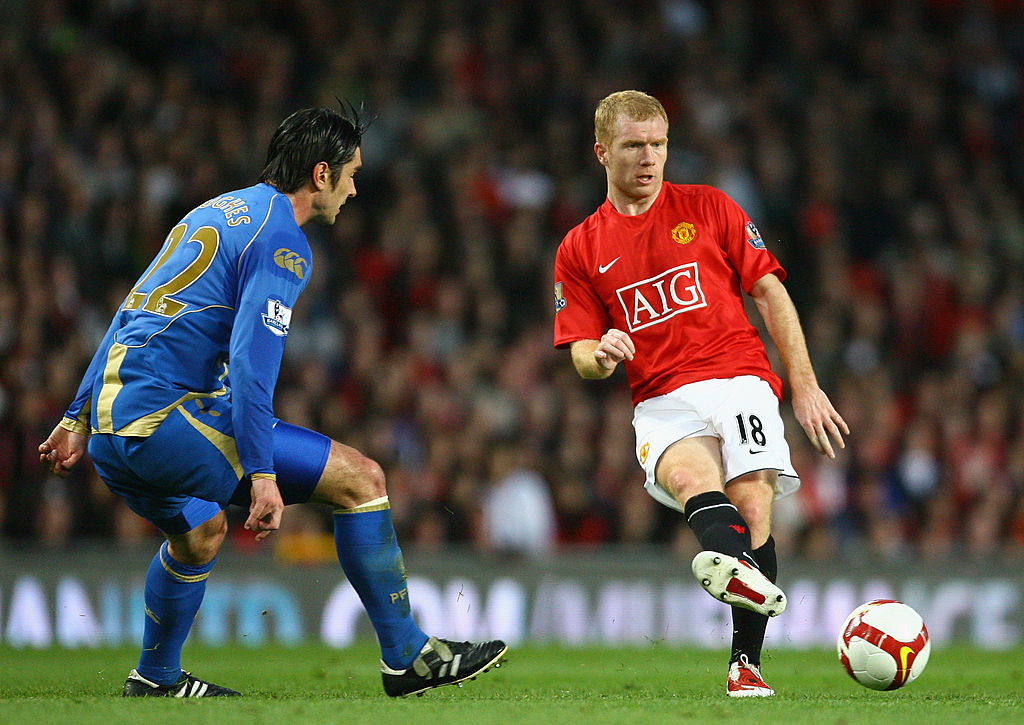
Another who played his whole career at United, and what a career it was! Scholes has won everything in the game, including an almost-inconceivable ten Premier League titles.
Scholes first started training with United at 14, although he wasn’t part of the 1992 FA Youth Cup-winning side as there were still concerns about his small stature. His technical and ball-striking ability soon came to the fore, though, and his range of passing, clever movement on and off the ball and vision for the game made him the complete midfielder.
Fellow midfield greats sung his praises, while Thierry Henry once described him as the greatest player in Premier League history. Scholes played over 700 times for United, scoring 155 goals. He had no interest in a celebrity lifestyle and has always lived out of the limelight away from football, but on the pitch he’s one of the all-time stars.
9. Peter Schmeichel (1991-1999)
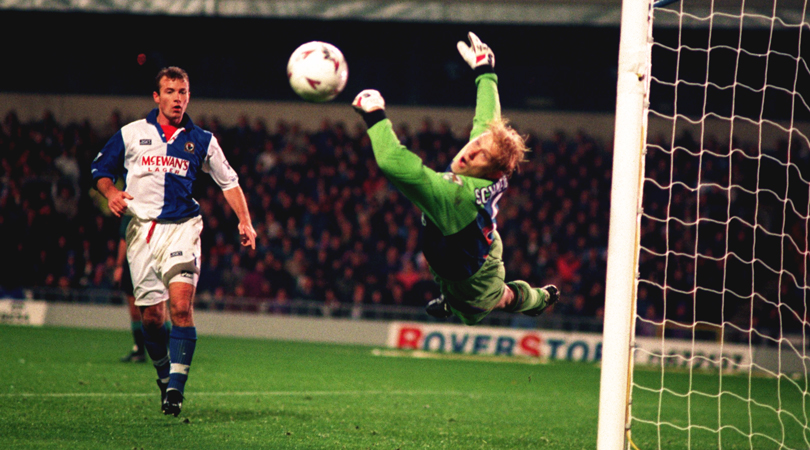
How many clubs would have a goalkeeper in their top ten players of all time? The answer to that is probably ‘any club for which Peter Schmeichel played’.
The great Dane enjoyed success at Brøndby before being picked up by United in August 1991 for £505,000, a price described at the end of his time at the club as the “bargain of the century” by Ferguson.
Schmeichel was tall but not exceptional for a modern goalie, but his ability to spread himself and ‘make himself big’ in the face of an onrushing forward often created a barrier that was impossible to breach.
In particular, Schmeichel would perform ‘star jump’ saves where his arms and legs would all be spread as wide as possible to fill any gaps. Schmeichel was also mentally strong and could come up with important saves in a game where he had spent the majority of the time as a spectator. His distribution was also excellent, and he could turn defence into attack with one throw.
The best features, fun and footballing quizzes, straight to your inbox every week.
8. Duncan Edwards (1953-1958)
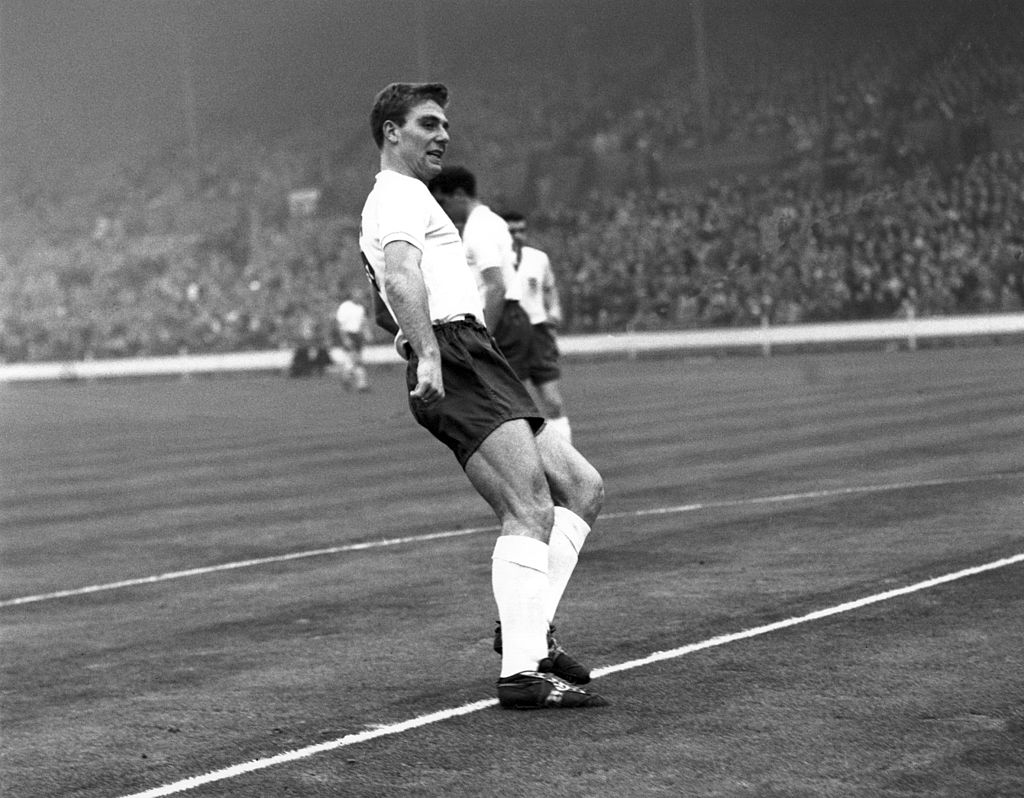
It’s hard to assess just how good Edwards was, as he was only 21 when he died at Munich, and unfortunately very little footage of him remains.
But we should listen to what his contemporaries said of him, including Busby, who described him as “the most complete player in Britain, and possibly the world,” and Charlton, who said he was “the best player I have ever seen. The best player I played with, for United or England.”
Edwards was equally adept with either foot, strong, powerful in the air and physically dynamic, with a range of passing few have ever equalled. At the time of his tragic death, Edwards had already played 177 times for United, scoring 21 goals, having joined as a teenager and making his first-team debut at 17.
He’d already played 18 games for England. At his funeral it was said that “talent, even genius, we will see again. But there will only ever be one Duncan Edwards.”
7. Ryan Giggs (1987-2014)
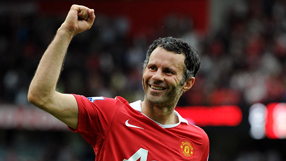
The Welsh winger made more appearances in a United shirt than anyone else (963) and stands equal seventh on the goalscoring list (168) despite playing as a winger, or latterly a midfielder. Unsurprisingly given his crossing ability, he also holds the record for the most assists in the Premier League.
Born in Cardiff but brought up in Salford, Giggs is very much a Manchester boy and the epitome of a one-club man. He won 13 league titles, two Champions Leagues, four FA Cups, four League Cups, the Club World Cup, the Intercontinental Cup and the UEFA Super Cup; he is the most decorated British footballer in history.
But set aside his longevity and his honours and consider his football. It’s not just that Giggs was fast; he was also balanced and athletic, which allowed him to weave down the left wing beating players for pace or for skill, to go wide or to cut back in.
Frequently dubbed ‘the new George Best’ when he exploded onto the scene as a 17 year old, Giggs, unlike Best, also had the mental fortitude and temperament to cope with both the acclaim and the criticism. His acceleration and ability to change direction while running at top speed led Ferguson to declare that he left defenders with “twisted blood”. A footballing phenomenon.
6. Wayne Rooney (2004-2017)
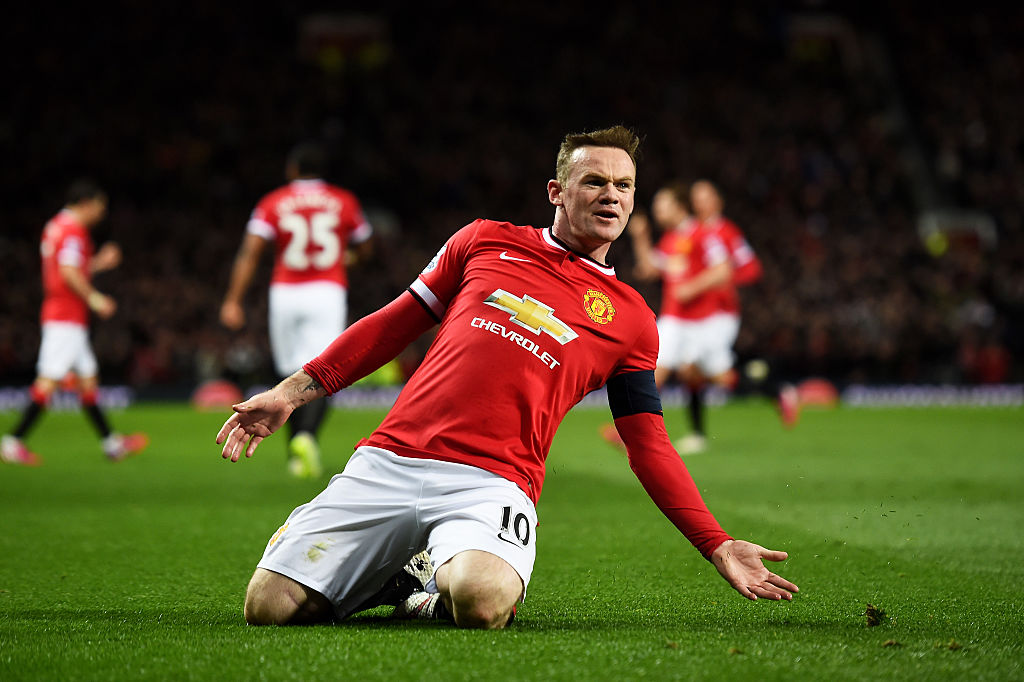
There’s sometimes a sense that Rooney was a supreme talent not wholly fulfilled, but in truth those reservations really belong to England. In the red of United he was a phenomenon, blasting onto the stage as an 18 year old to score a hat-trick in a Champions League match with Fenerbahçe and going on to win every major club honour.
Rooney was born in Croxteth in Liverpool and grew up as an Everton fan. He was associated with the club from the age of nine, but Everton’s precarious financial position forced them into a sale, and in August 2004 he moved to United.
On his signing, Denis Law declared that Rooney would “have all the United records”, and in terms of goalscoring, at least, he was proven right. His 253 goals make him United’s leading goalscorer, and he is behind only Alan Shearer as the Premier League’s top goalscorer. He also has 103 assists, placing him third in the all-time list. Quite possibly the last ‘street’ footballer.
5. Denis Law (1962-1973)
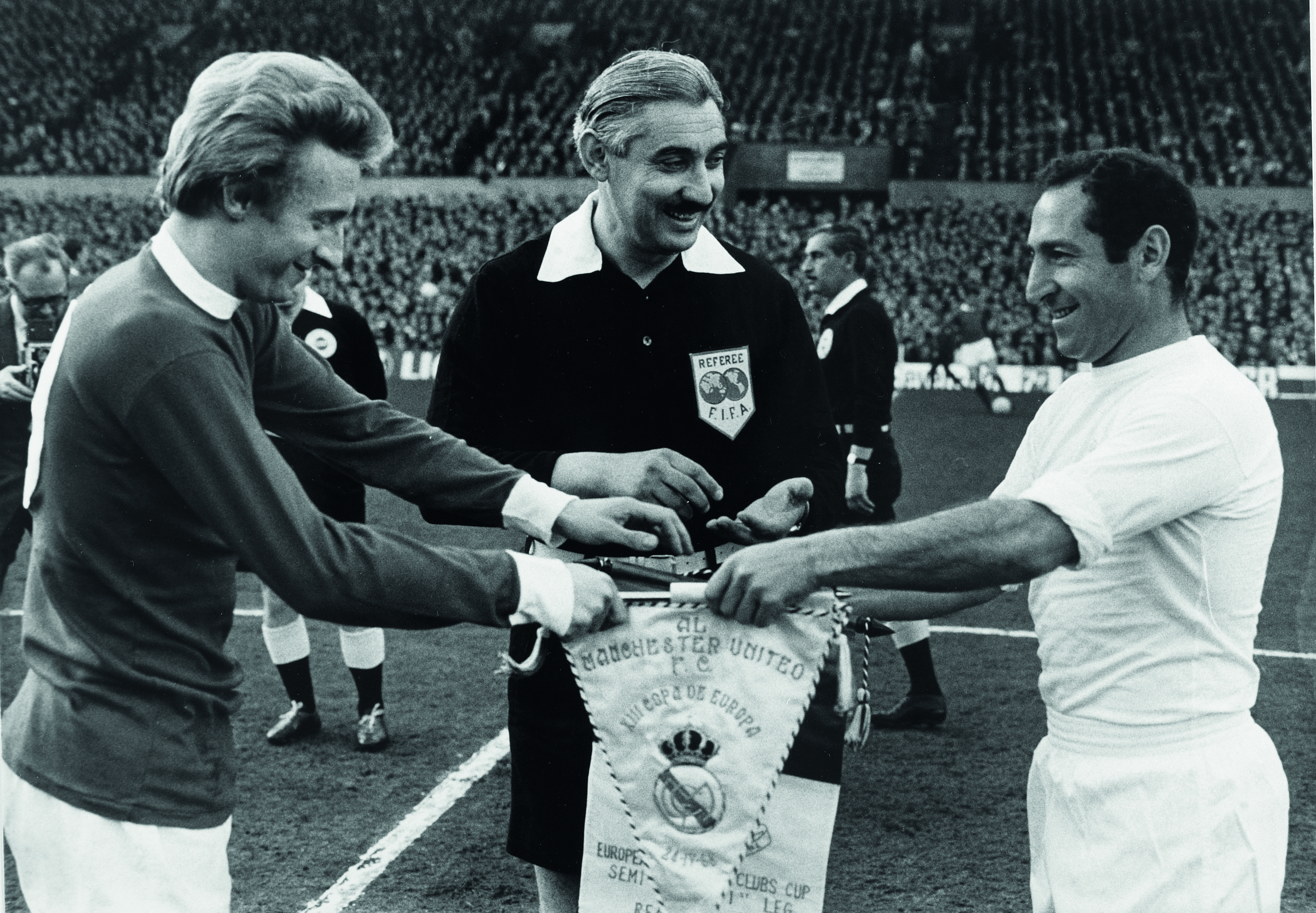
Law was born in Aberdeen and grew up in poverty in a council house where shoes were considered a luxury. His talent for football was a way out, and he seized the opportunity with both hands, first with Huddersfield Town and Manchester City, then with Torino in Italy and back to Manchester, this time with United, for who he debuted on 18 August 1962.
Law’s time at the club largely coincided with a fallow, post-Munich period, so his honours of two league titles and an FA Cup – though he was famously injured for the European Cup final – vastly understate both his importance and his ability.
But as a goal-scorer, Law was ‘The King’, notching 237 of them in 404 games, including 34 in 46 FA Cup games and 28 in 33 in Europe. With 30 goals in 55 games, he is the joint top all-time scorer for Scotland, matching Kenny Dalglish, who took 102 caps to notch the same total.
4. Eric Cantona (1992-1997)
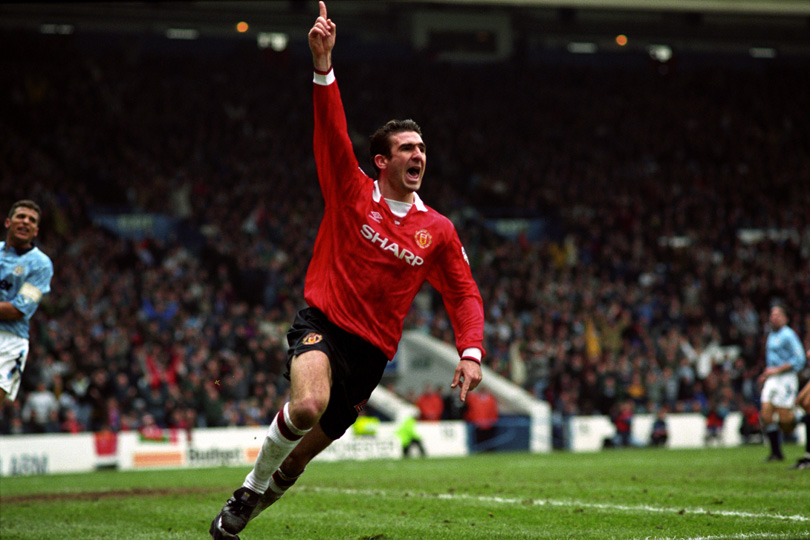
More than a few good players have wilted when they came to United. The club, and its history, are just too big for some people. Cantona was the opposite. He swaggered in, stuck his chest out, raised his head and surveyed everything as though he were asking, ‘I’m Cantona. Are you big enough for me?’
If ever there was a player that was made for United, it was Cantona. The story of how he came to Old Trafford is legendary; it started with a casual enquiry from Leeds United about the availability of Denis Irwin and ended with the maverick forward signing for United for £1.2 million.
In fairness to Leeds, most commentators felt it was good business – Cantona was talented but wayward, and none of his previous clubs had kept him happy for long. People looked at him, shirt collar turned up, insouciance personified, and saw a dilettante. It was nonsense.
Cantona was an inveterate trainer, dedicated to his craft and frequently found doing extra sessions. That attitude rubbed off on the young players around him, who grew up thinking it was the norm. In his five seasons at the club they won four league titles and two FA Cups, gaining the self-belief that would lead to many more, for which Cantona was the catalyst.
3. Bryan Robson (1981-1994)
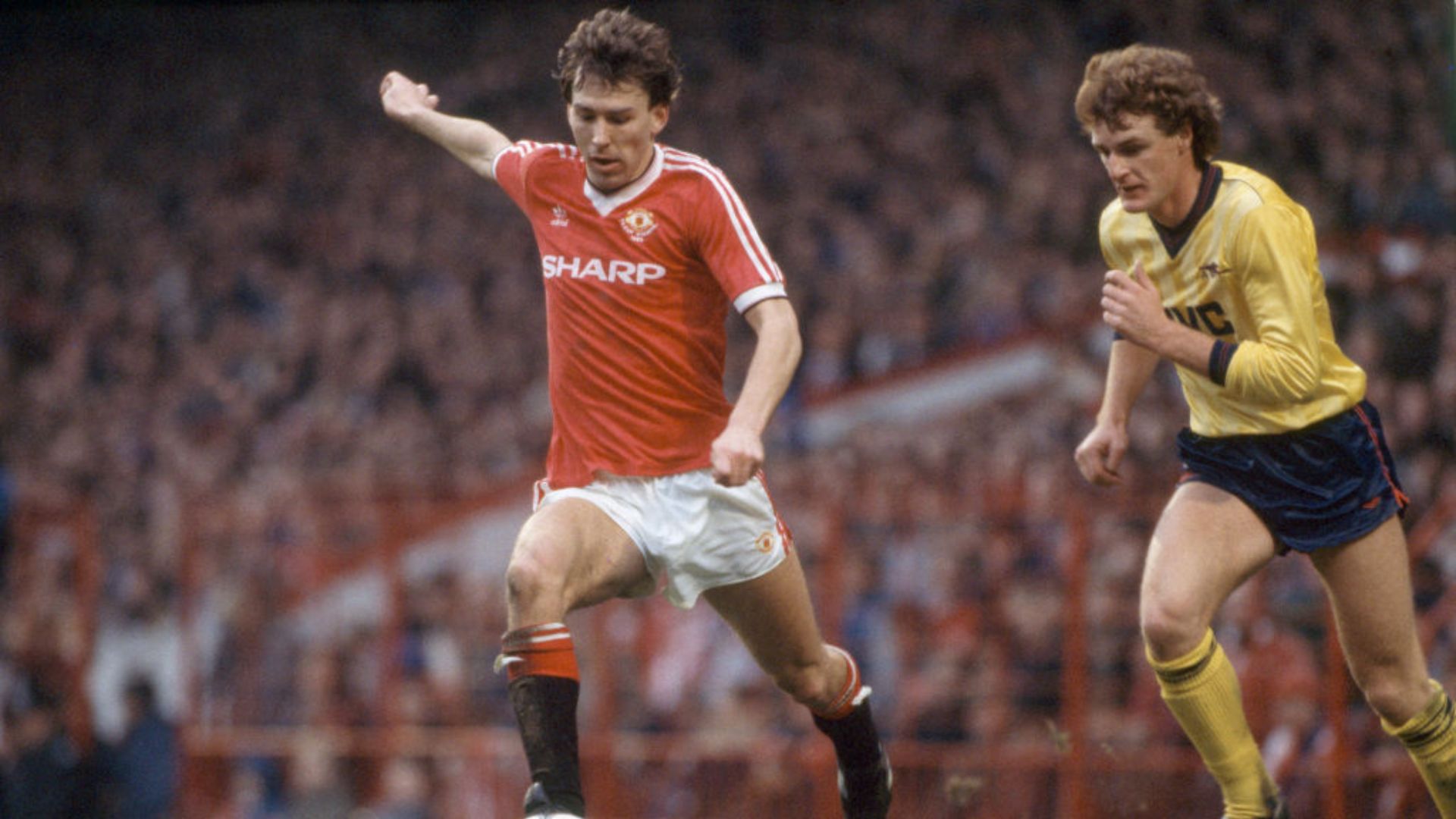
Younger United fans might find it hard to believe we ever had a box-to-box midfielder better than Roy Keane. But those of us who were around when Robson was in his prime know that we did.
Robson was Captain Marvel, a man with a ridiculous engine, capable of breaking up play in his own box and still being on the end of a cross into the opponent’s box seconds later. His peak came before Ferguson’s great league-winning sides, so his list of personal honours isn’t as big as it should have been, but his commitment to the cause can never be doubted.
The only problem with Robson was that the team were overly reliant on him, and his regular bouts of injury meant that he did miss games – sometimes important ones. Robbo played 461 times for United – scoring 99 goals, a decent return for a midfielder – but could have played so many more.
He was United’s longest-serving captain and always led by example. Robson also played 90 games for England, in 65 of which he was the captain, scoring 26 goals. Manager Bobby Robson described him as “as good a player as we’ve ever produced”.
2. George Best (1963-1974)
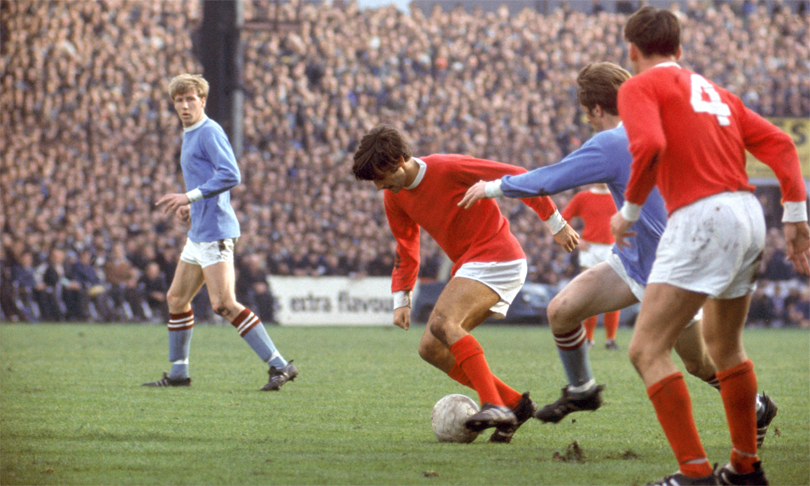
Best was the man who originated the Number 7 legend at United, making the shirt an icon of skill, desire and status. Among its wearers have been Ronaldo, Cantona, Beckham and Robson. But Best was the best of the lot, a supremely talented footballer who could dribble, pass, perform outrageous tricks and score goals.
Busby once said of him that he was the best at everything at the club – best tackler, fastest runner, hardest shooter, most skilful… and as with Cantona years later, the flamboyance was backed by a work ethic that meant Best was a great trainer.
He scored 179 goals in 470 matches – an impressive number for a player who was not an out-and-out striker and was rarely the beneficiary of a tap in. Many of them are memorable, owing to his sublime touch and insane ball control, which enabled him to dribble past defenders and round goalkeepers.
Best had his problems off the pitch, wanting to outdo everyone there as well as on it before finally succumbing to his destructive streak, but as José Mourinho famously said: “Players like George Best never die. What they leave behind them never dies.” Anyone who saw Best at his peak will attest to the truth of that verdict.
1. Bobby Charlton (1953-1973)
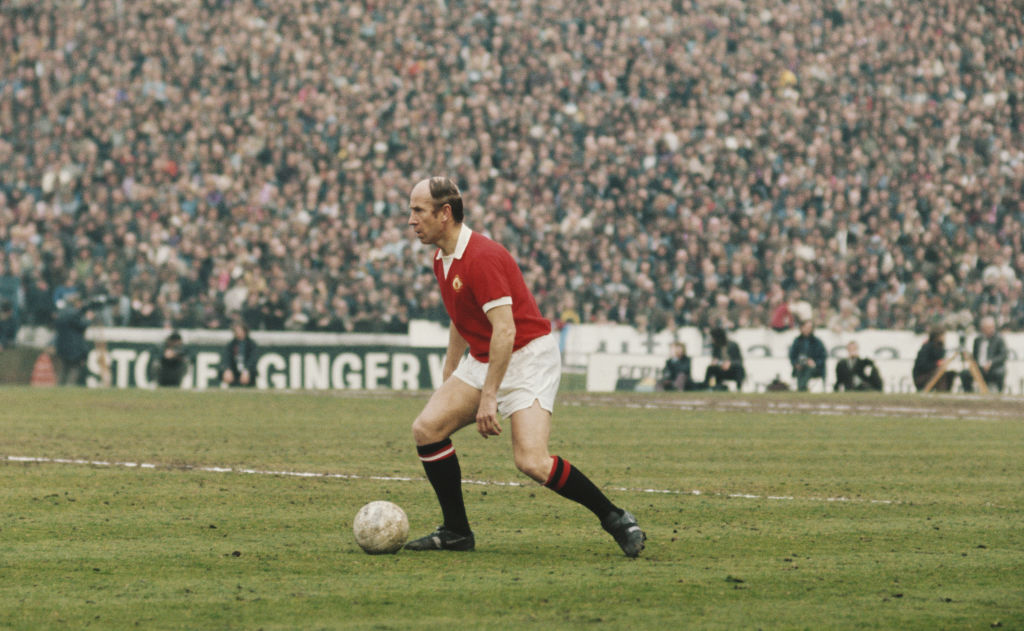
Charlton was more than a great player; he was the rock on which the club was anchored in the dark days after Munich, the one constant (even above Busby) who kept the club afloat, kept the dream alive and dragged the club back to the pinnacle of the sport.
For a long time Charlton was at the head of both the all-time appearances list (758) and the all-time scorers list (249), and though he’s now slipped into second place on both, behind Giggs and Rooney respectively, it’s still a mark of the player as to how long and successful his United career was.
Born in Northumberland, Charlton signed to the club as a 15 year old on 9 February 1953, although his mother insisted he start an apprenticeship as an electrical engineer in case the football didn’t work out.
Strong and well balanced, with a piledriver of a right foot – though he was genuinely two-footed – Charlton was equally at home in midfield or up front. He always carried with him the pain of losing his friends and team-mates, but he paid them homage in the best way possible by winning the European Cup.
Current page: The 50 best Manchester United players ever: 10-1
Prev Page The 50 best Manchester United players ever: 20-1